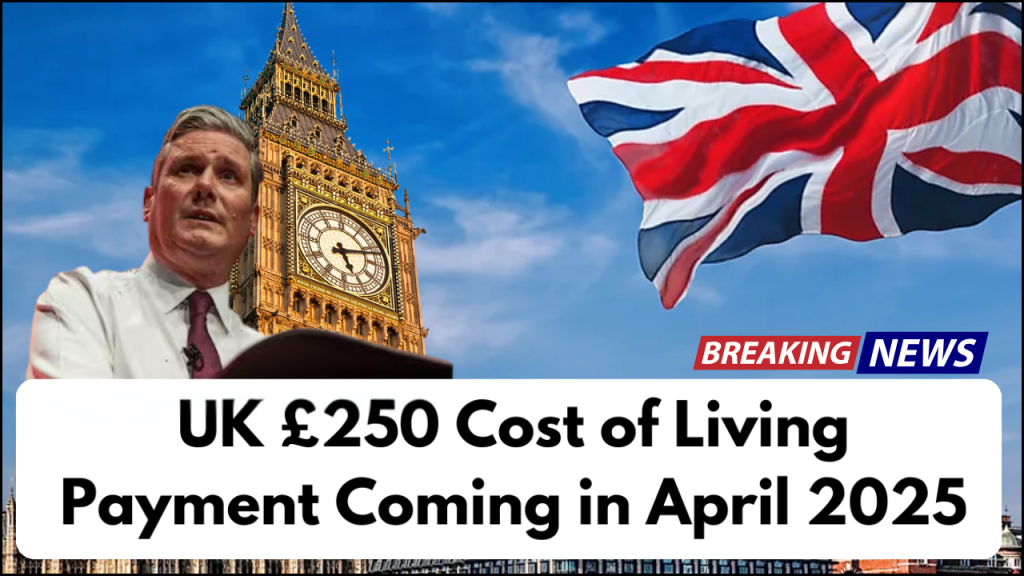
April 2025 is bringing a little relief for many households in the UK. If you’ve been feeling the pinch from rising food prices, higher energy bills, and the general cost of living, there’s good news. The UK government has announced a one-off £250 payment to help people cope with these increasing expenses.
In this article, we’ll break down everything you need to know about this payment – who gets it, how it works, and what you need to do (if anything) to receive it.
Why Is This Payment Being Given?
Let’s face it – times have been tough. The cost of living has gone up a lot over the past year. Grocery bills are higher, heating your home costs more, and it seems your money doesn’t go as far as it used to. The government understands that many people are struggling and wants to provide financial support to those who need it most.
That’s why the £250 cost-of-living payment will be rolled out in April 2025. It’s a way to help people manage essential living costs and ease some of the financial pressure.
Who Is Eligible for the £250 Payment?
This payment isn’t for everyone – it’s aimed at people who are more vulnerable or have lower incomes. Here’s a breakdown of who might qualify:
1. People on Means-Tested Benefits
If you already receive government support, like:
- Universal Credit
- Income Support
- Pension Credit
- Income-based Jobseeker’s Allowance (JSA)
- Income-related Employment and Support Allowance (ESA)
- Working Tax Credit or Child Tax Credit
…then you’re likely eligible. The good news is that you don’t need to apply – the payment will be sent to you automatically.
2. Pensioners
If you’re receiving Pension Credit, you’re also covered. The payment will be sent directly, just like your usual benefits.
If you’re of pension age but not yet claiming Pension Credit, now’s a great time to check if you qualify. You might not only be eligible for this £250, but also for other helpful support programs.
3. People with Disabilities
If you receive disability-related benefits such as:
- Personal Independence Payment (PIP)
- Disability Living Allowance (DLA)
- Attendance Allowance
…you could also qualify. Some councils may ask for medical documents, so keep those handy just in case.
4. Low-Income Households Not on Benefits
Even if you’re not receiving any government benefits, you may still be able to get this payment if your income is low. Each local council will decide who qualifies based on things like:
- Household income
- Savings (usually less than £2,000)
- Living expenses
- Number of people in the household
In this case, you’ll need to apply manually through your local council.
How Do You Receive the Payment?
The process depends on your situation. Here’s how it works:
| Payment Method | Who It’s For | What You Need to Do |
|---|---|---|
| Automatic Payment | People on benefits or Pension Credit | Nothing – it will be paid automatically |
| Manual Application | Low-income households not on benefits | Apply through your local council |
How to Apply (If You Need To)
If you don’t get benefits but think you qualify based on your income, you’ll need to apply through your local council. Here’s a quick guide to help:
- Check Your Finances
Gather your income details, expenses, and savings. - Find Your Local Council
Go to the official government website to find contact details for your council. - Follow Application Instructions
Each council may have its form and requirements. - Collect Your Documents
You’ll likely need:- Proof of income (like payslips)
- Proof of ID
- Recent bills (energy, rent, etc.)
- Submit Your Application
Follow the instructions carefully to make sure it’s complete. - Wait for a Decision
Processing times can take anywhere from 2 to 6 weeks.
What’s the Household Support Fund?
This £250 payment is part of a larger program called the Household Support Fund (HSF). This fund was created to help people pay for essential things like:
- Food
- Heating
- Rent
- Necessities
The HSF started a few years ago and has been extended again until March 2026. Local councils are in charge of giving out the money, which means they can tailor it to fit the needs of people in their area.
Other Help You Can Get
If the £250 payment isn’t quite enough, other programs might help you stay on top of your bills:
1. Winter Fuel Payment
For pensioners. You can get between £250 and £600 to help with heating costs in the winter.
2. Cold Weather Payment
If the temperature stays very low for several days, you could receive £25 per week to help with heating costs.
3. Warm Home Discount
This gives qualifying households a £140 discount on electricity bills. It’s usually applied directly to your energy account.
4. Council Tax Support
If your income is low, you could get help with paying your council tax bill. Check with your local council to see what’s available.
Final Thoughts
With living costs still high, every bit of financial help counts. The £250 cost-of-living payment arriving in April 2025 is a welcome boost for many households. Whether you’re receiving benefits, living on a low income, or supporting someone with a disability, this support could make a real difference.
If you’re not sure whether you qualify, it’s worth checking with your local council or visiting the official UK government website for guidance.
Make sure to stay informed, gather any needed documents, and take action if required. A little preparation now could mean getting the help you need when it matters most.



انا حتاج الكثر متطلبت مثل ملابس مثل اكل او شرب أو تلفون
حتاج دفع يجار